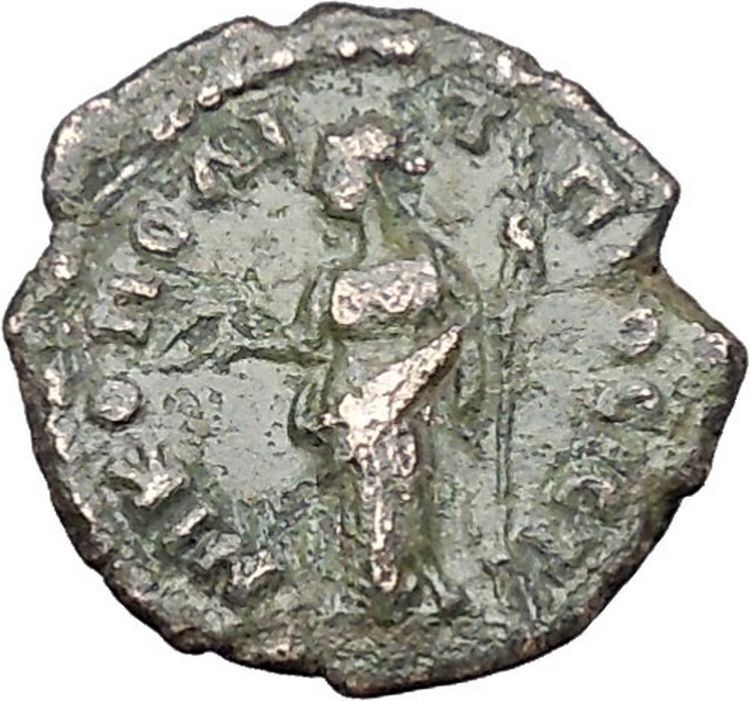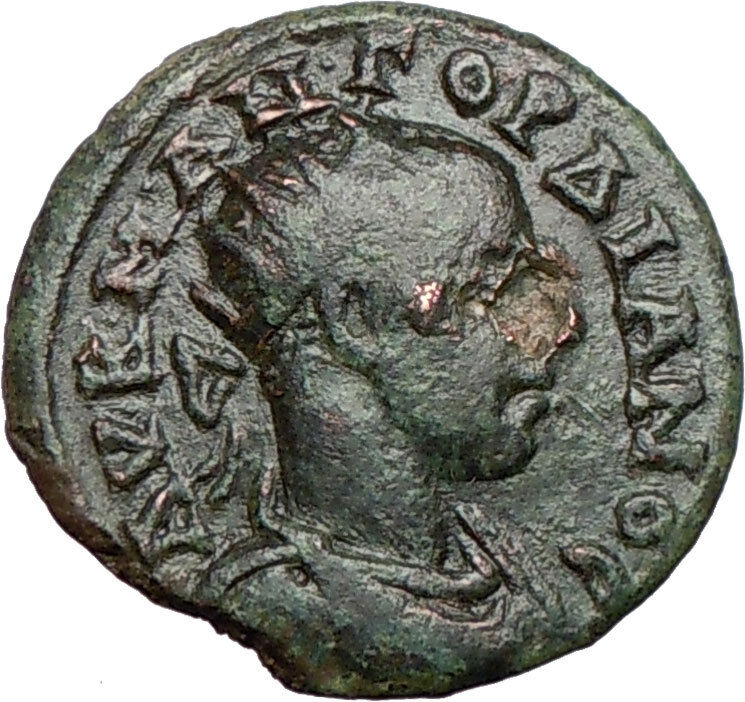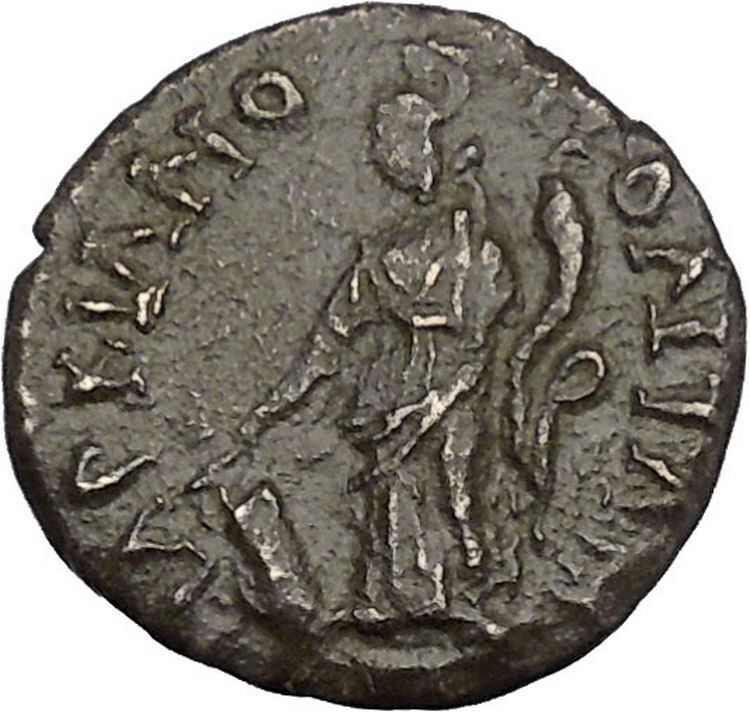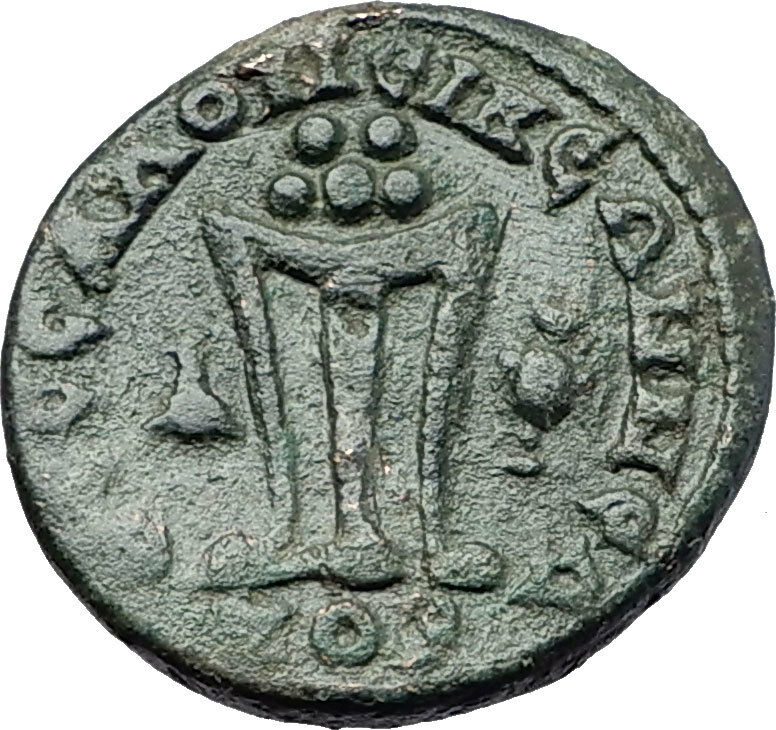|
Julia Titi, daughter of Titus, Augusta 79-90/1 A.D.
Silver Cistophoric Tetradrachm (Cistophorus) 26mm
Struck 82 A.D. at the Ephesus mint (or possibly Rome) for circulation in Asia
Reference: RIC II (Domitian) 848.
Certification: NGC Ancients F 5746448-058
IVLIA AVGVSTA DIVI TITI F•, draped bust of Julia Titi right, seen from front, hair bunched at front, thickly braided and tucked in small chignon at base of head.
VESTA, Vesta seated left on bench decorated with drapery, feet on stool, palladium in right hand, transverse scepter in left.
You are bidding on the exact item pictured, provided with a Certificate of Authenticity and Lifetime Guarantee of Authenticity.
Vesta, one of the great Roman divinities, identical with the Greek Hestia, both in name and import. She was the goddess of the hearth, and therefore inseparably connected with the Penates ; for Aeneas was believed .to have brought the eternal fire of Vesta from Troy, along with the images of the Penates; and the praetors, consuls, and dictators, before entering upon their official functions, sacrificed, not only to the Penates, but also to Vesta at Lavinium. In the ancient Roman house, the hearth was the central part, and around it all the inmates daily assembled for their common meal (coena) ; every meal thus taken was a fresh bond of union and affection among the members of a family, and at the same time an act of worship of Vesta, combined with a sacrifice to her and the Penates. Every dwelling-house therefore was, in some sense, a temple of Vesta ; but a public sanctuary united all the citizens of the state into one large family. This sanctuary stood in the Forum, between the Capitoline and Palatine hills, and not far from the temple of the Penates. The temple was round with a vaulted roof, like the impluvium of private houses, so that there is no reason to regard that form as an imitation of the vault of heaven. The goddess was not represented in her temple by a statue, but the eternal fire burning on her hearth or altar was her living symbol, and was kept up and attended to by the Vestals, her virgin priestesses. As each house, and the city itself, so also the country had its own Vesta, and the latter was worshipped at Lavinium, the metropolis of the Latins, where she was worshipped and received the regular sacrifices at the hands of the highest magistrates. The goddess herself was regarded as chaste and pure like her symbol, the fire ; and the Vestals who kept up the sacred fire were likewise pure maidens. On the 1st of March in every year her sacred fire, and the laurel tree which shaded her hearth, were renewed, and on the 15th of June her temple was cleaned and purified. The dirt was carried into an angiportus behind the temple, which was locked by a gate that no one might enter it. The day on which this took place was a dies nefastus the first half of which was thought to be so inauspicious, that the priestess of Juno was not allowed to comb her hair or to cut her nails, while the second half was very favourable to contracting a marriage or entering upon other important undertakings. A few days before that solemnity, on the 9th of June, the Vestalia was celebrated in honour of the goddess, on which occasion none but women walked to the temple, and that with bare feet.
 Julia Titi Flavia (13 September 64 – 91) was the daughter and only child to Emperor Titus from his second marriage to the well-connected Marcia Furnilla. Her parents divorced when Julia was an infant, due to her mother’s family being connected to the opponents of Roman Emperor Nero. In 65, after the failure of the Pisonian conspiracy, the family of Marcia Furnilla was disfavored by Nero. Julia’s father, Titus considered that he didn’t want to be connected with any potential plotters and ended his marriage to Marcia Furnilla. Julia was raised by her father. Julia had been born in Rome and Titus conquered Jerusalem on Julia’s sixth birthday. Julia Titi Flavia (13 September 64 – 91) was the daughter and only child to Emperor Titus from his second marriage to the well-connected Marcia Furnilla. Her parents divorced when Julia was an infant, due to her mother’s family being connected to the opponents of Roman Emperor Nero. In 65, after the failure of the Pisonian conspiracy, the family of Marcia Furnilla was disfavored by Nero. Julia’s father, Titus considered that he didn’t want to be connected with any potential plotters and ended his marriage to Marcia Furnilla. Julia was raised by her father. Julia had been born in Rome and Titus conquered Jerusalem on Julia’s sixth birthday.
When growing up, Titus offered her in marriage to his brother Domitian, but he refused because of his infatuation with Domitia Longina. Later she married her second paternal cousin Titus Flavius Sabinus, brother to consul Titus Flavius Clemens, who married her first cousin Flavia Domitilla. By then Domitian had seduced her.
When her father and husband died, in the words of Dio, Domitian:
“lived with [her] as husband with wife, making little effort at concealment. Then upon the demands of the people he became reconciled with Domitia, but continued his relations with Julia nonetheless.”
Juvenal condemns this liaison as follows:
“Such a man was that adulterer [i.e. Domitian] who, after lately defiling himself by a union of the tragic style, revived the stern laws that were to be a terror to all men – ay, even to Mars and Venus – just as Julia was relieving her fertile womb and giving birth to abortions that displayed the likeness of her uncle.”
Becoming pregnant, Julia died of what was rumored (though unlikely) to be a forced abortion. Julia was deified and her ashes were later mixed and smoked with Domitian’s by an old nurse secretly in the Temple of the Flavians.
 Titus – Roman Emperor: 79-81 A.D. Titus – Roman Emperor: 79-81 A.D.
69-71 A.D. – Caesar (Under Vespasian, with Domitian)
71-79 A.D. – Imperator (Under Vespasian; Domitian, as Caesar)
79-81 A.D. – Sole Reign (with Domitian, as Caesar)
| Son of Vespasian and Domitilla the Elder | Brother of Domitian and Domitilla the Younger | Father of Julia Titi | Great-uncle of Vespasian Junior
Titus Flavius Vespasianus, commonly known as Titus (December 30, 39 – September 13, 81), was a Roman Emperor who briefly reigned from 79 until his death in 81. Titus was the second emperor of the Flavian dynasty, which ruled the Roman Empire between 69 and 96, encompassing the reigns of Titus’s father Vespasian (69-79), Titus himself (79-81) and his younger brother Domitian (81-96).
Prior to becoming emperor, Titus gained renown as a military commander, serving under his father in Judaea during the First Jewish-Roman War, which was fought between 67 and 70. The campaign came to a brief halt with the death of emperor Nero on June 9, 68, launching Vespasian’s bid for the imperial power during the Year of the Four Emperors. When Vespasian was declared emperor on July 1, 69, Titus was left in charge of ending the Jewish rebellion, which he did in 70, successfully besieging and destroying the city and the Temple of Jerusalem. For this achievement Titus was awarded a triumph; the Arch of Titus commemorates his victory to this day.
Under the rule of his father, Titus gained infamy in Rome serving as prefect of the Roman imperial bodyguard, known as the Praetorian Guard, and for carrying on a controversial relationship with the Jewish queen Berenice. Despite concerns over his character, however, Titus ruled to great acclaim following the death of Vespasian on June 23, 79, and was considered a good emperor by Suetonius and other contemporary historians. In this role he is best known for his public building program in Rome-completing the Flavian Amphitheatre, otherwise known as the Colosseum- and for his generosity in relieving the suffering caused by two disasters, the Mount Vesuvius eruption of 79 and the fire of Rome of 80. After barely two years in office, Titus died of a fever on September 13, 81. He was deified by the Roman Senate and succeeded by his younger brother Domitian.
|








 Julia Titi Flavia (13 September 64 – 91) was the daughter and only child to Emperor Titus from his second marriage to the well-connected Marcia Furnilla. Her parents divorced when Julia was an infant, due to her mother’s family being connected to the opponents of Roman Emperor Nero. In 65, after the failure of the Pisonian conspiracy, the family of Marcia Furnilla was disfavored by Nero. Julia’s father, Titus considered that he didn’t want to be connected with any potential plotters and ended his marriage to Marcia Furnilla. Julia was raised by her father. Julia had been born in Rome and Titus conquered Jerusalem on Julia’s sixth birthday.
Julia Titi Flavia (13 September 64 – 91) was the daughter and only child to Emperor Titus from his second marriage to the well-connected Marcia Furnilla. Her parents divorced when Julia was an infant, due to her mother’s family being connected to the opponents of Roman Emperor Nero. In 65, after the failure of the Pisonian conspiracy, the family of Marcia Furnilla was disfavored by Nero. Julia’s father, Titus considered that he didn’t want to be connected with any potential plotters and ended his marriage to Marcia Furnilla. Julia was raised by her father. Julia had been born in Rome and Titus conquered Jerusalem on Julia’s sixth birthday. Titus – Roman Emperor: 79-81 A.D.
Titus – Roman Emperor: 79-81 A.D. 




